IHMM Government Affairs
Advocacy seeks to ensure that all people in society are able to have their voices heard on issues that are important to them.
Our advocacy seeks to protect and promote our rights as citizens. Advocacy ensures that we have our views
and wishes genuinely considered when decisions are being made about our lives.

IHMM Federal Issues – Pending Actions With Deadlines
In this section you will find the federal issues on which IHMM has interests and the comment periods are still open with deadlines.






IHMM Federal Issues – Completed Actions
In this section you will find the federal issues on which IHMM has interests and are completed actions.

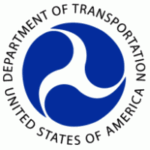
DOT Publishes Notice of Proposed Rulemaking for Electronic Signatures, Forms and Storage for Drug and Alcohol Testing Records
Deadline: December 16, 2024
Today, October 15, 2024, the Department of Transportation (DOT) published a notice of proposed rulemaking (NPRM) in the Federal Register proposing to amend its regulations for conducting workplace drug and alcohol testing for the federally regulated transportation industry to allow, but not require, electronic signatures on documents required to be created and utilized under the regulations, the use of electronic versions of forms, and the electronic storage of forms and data.
The regulatory changes would apply to DOT-regulated employers and their contractors (“service agents”) who administer their DOT-regulated drug and alcohol testing programs. Currently, employers and their service agents must use, sign and store paper documents exclusively, unless the employer is utilizing a laboratory’s electronic Federal Drug Testing Custody and Control Form system that has been approved by the Department of Health and Human Services. DOT is required by statute to amend its regulations to authorize, to the extent practicable, the use of electronic signatures or digital signatures executed to electronic forms instead of traditional handwritten signatures executed on paper forms.
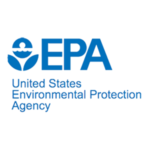
Addition of Certain Per- and Polyfluoroalkyl Substances (PFAS) to the Toxics Release Inventory (TRI)
Deadline: December 9, 2024
The Environmental Protection Agency (EPA) is proposing to add 16 individually listed per- and polyfluoroalkyl substances (PFAS) and 15 PFAS categories to the Toxics Release Inventory (TRI) list of toxic chemicals subject to reporting under the Emergency Planning and Community Right-to-Know Act and the Pollution Prevention Act. EPA also addresses how PFAS categories should be treated and discusses what events may trigger the automatic addition of a PFAS to the TRI. Comments due December 9.
The Environmental Protection Agency (EPA) is proposing to add 16 individually listed per- and polyfluoroalkyl substances (PFAS) and 15 PFAS categories to the Toxics Release Inventory (TRI) list of toxic chemicals subject to reporting under the Emergency Planning and Community Right-to-Know Act (EPCRA) and the Pollution Prevention Act (PPA) to comply with the National Defense Authorization Act for Fiscal Year 2020 (NDAA). EPA also addresses how PFAS categories should be treated. Separately, EPA discusses what events may trigger the automatic addition of a PFAS to the TRI pursuant to the NDAA. This discussion does not propose to list chemicals to TRI pursuant to the NDAA, but rather describes what EPA documents and activities involving PFAS would trigger an automatic addition under the NDAA.
DATES:
Comments must be received on or before December 9, 2024. Comments on the information collection provisions submitted to the Office of Management and Budget (OMB) under the Paperwork Reduction Act (PRA) are best assured of consideration by OMB if OMB receives a copy of your comments on or before November 7, 2024.
ADDRESSES:
Submit your comments, identified by docket identification (ID) number EPA-HQ-OPPT-2023-0538, through https://www.regulations.gov. Follow the online instructions for submitting comments. Do not submit electronically any information you consider to be Confidential Business Information (CBI) or other information whose disclosure is restricted by statute. Additional instructions on commenting or visiting the docket, along with more information about dockets generally, is available at https://www.epa.gov/dockets.

EPA Seeks Public Comment on Manufacture of Certain PFAS during Fluorination of HDPE and Other Plastic Containers
Deadline: November 29, 2024
On September 30, 2024, the U.S. Environmental Protection Agency (EPA) requested public comment on the manufacture of certain per- and polyfluoroalkyl substances (PFAS), including perfluorooctanoic acid (PFOA), perfluorononanoic acid (PFNA), and perfluorodecanoic acid (PFDA), during the fluorination of high-density polyethylene (HDPE) and other plastic containers to inform regulations as appropriate under the Toxic Substances Control Act (TSCA). 89 Fed. Reg. 79581. EPA notes that this request for comment follows its grant on July 10, 2024, of a TSCA Section 21 petition requesting that EPA establish regulations under TSCA Section 6 prohibiting the manufacturing, processing, use, distribution in commerce, and disposal of PFOA, PFNA, and PFDA formed during the fluorination of plastic containers. Comments are due November 29, 2024. This is a unique situation because it is unclear whether EPA has the authority under TSCA Section 6 to move straight to rulemaking, given the available fact set. For more information and our insightful Commentary, please read the full memorandum.
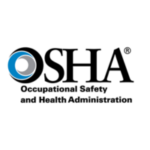
OSHA Emergency Response Standard Hearing
Public Hearing November 12, 2024
The Occupational Safety and Health Administration (OSHA) issued a notice scheduling an informal public hearing on its proposed rule ‘‘Emergency Response Standard’’ mentioned in the email below.… Read More

EPA Begins 90-Day Comment Period on Proposed High-Priority Substance Designations for Five Chemicals
Deadline: October 23, 2024
| The U.S. Environmental Protection Agency (EPA) announced on July 25, 2024, that it is proposing to designate acetaldehyde, acrylonitrile, benzenamine, vinyl chloride, and 4,4-methylene bis(2-chloroaniline) (MBOCA) as high-priority substances… Read More |
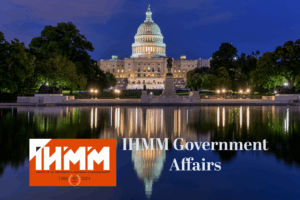
IHMM Signs Letter Opposing Reductions in OSH Worker’s Pay
The IHMM Government Affairs Committee has agreed to sign a coalition letter opposing reductions in pay for IH and OSH employees.
Why IHMM Is Interested in This Act – Protecting CSHMs, CSMPs, and ASHMs in government
As the attached letter states, part of the concern and reason we signed onto this letter is that “if VA’s proposed pay downgrade moves forward, it could inspire other agencies to reduce the pay of industrial hygienists and other occupational and environmental health and safety workers they employ. The likely result of such a scenario would be a weakening of the entire Federal government’s ability to protect workers and their communities from health and safety hazards, as it will likely take longer and become harder to find and hire employees for these critical positions; this action runs counter to the intended outcomes of the consistency review process.”
Useful Resource
Here’s a link to a Federal News Network article about the VA’s proposal: https://federalnewsnetwork.com/pay/2024/04/va-reviewing-4000-employee-positions-at-risk-of-downgrade-in-pay-scale/

EPA Publishes Compliance Guide for Final Methylene Chloride Risk Management Rule
On July 10, 2024, the U.S. Environmental Protection Agency (EPA) published a compliance guide for its final methylene chloride risk management rule… Read More
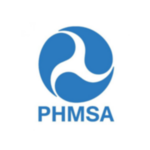
Hazardous Materials: Notice of Applications for New Special Permits
In accordance with the procedures governing the application for, and the processing of, special permits from the Department of Transportation’s Hazardous Material Regulations, notice is hereby given that the Office of Hazardous Materials Safety has received the application described herein… Read More

Attention Transporters of Hazardous Materials: PHMSA Proposes Registration Fee Updates
In order to account for increased transport of hazardous materials as well as the burdens such transport places on first responders, PHMSA proposes overdue updates to the registration fees… Read More

National Emission Standards for Hazardous Air Pollutants From Hazardous Waste Combustors Malfunction and Electronic Reporting Amendments
Deadline: September 9, 2024
The Environmental Protection Agency (EPA) is proposing to amend the National Emission Standards for Hazardous Air Pollutants (NESHAP) from Hazardous Waste Combustors (HWC) to remove the exemptions and revise other provisions associated with emission standard exemptions… Read More

Hazardous Materials: Harmonization With International Standards – IHMM Comments Filed 7/31/2023
PHMSA proposes to amend the Hazardous Materials Regulations to maintain alignment with international regulations and standards by adopting various amendments, including changes to proper shipping names, hazard classes, packing groups, special provisions, packaging authorizations, air transport quantity limitations, and vessel stowage requirements.
FR Citation: 88 FR 34568
Published 5/30 comments by 7/31
Docket No. PHMSA-2021-0092 (HM-215Q)
Read IHMM’s Comments on this proposed rule here.

PHMSA Seeks Comment on Initiatives to Modernize the HMR
On July 5, 2023, the Pipeline and Hazardous Materials Safety Administration (PHMSA) published an advance notice of proposed rulemaking (ANPRM) to solicit stakeholder feedback on initiatives PHMSA is considering that may modernize the Hazardous Materials Regulations (HMR) and improve efficiencies while maintaining or improving a current high level of safety. 88 Fed. Reg. 43016. To engage fully with stakeholders, the ANPRM solicits comments and input on questions related to 46 distinct topics under consideration. PHMSA states that it will use any comments, data, and information received “to evaluate and potentially draft proposed amendments.”
Comments are due October 3, 2023. PHMSA notes that it “will consider late-filed comments to the extent possible.” This memorandum provides more information on several of the topics under consideration: non-bulk packaging, intermediate bulk container (IBC), and large packaging periodic retest extension; aerosol classification alignment; requirements for damaged, defective, or recalled lithium cells and batteries; and 49 C.F.R. Section 173.150 ethyl alcohol exception. It includes highlights of PHMSA’s questions on these topics. Stakeholders should review the notice for the complete list of questions as well as the other topics addressed by the notice. For more information, please read the full memorandum.
Read more >> https://www.lawbc.com/regulatory-developments/entry/phmsa-seeks-comment-on-initiatives-to-modernize-the-hmr

More Federal Recognition for the CSHM, CSMP, CHMM, and CHMP – IHMM Comments to OSHA Voluntary Protection Program [VPP]
OSHA’s Voluntary Protection Programs (VPP) was initiated in 1982 to recognize workplaces with exceptional safety and health management. VPP was groundbreaking, being among the first programs to employ a management system structure emphasizing management leadership, worker participation, robust hazard identification and control, and training. In the intervening 40+ years, the program has grown to include a wide variety of organizations in many industries. Much has been learned about safety and health management since the VPP requirements were last updated in 1989. OSHA published its Recommended Practices for Safety and Health Programs in 2016 and consensus standards have been published at both the national (ANSI Z10-2019) and international level (ISO 45001-2018).
OSHA is seeking public input as it considers updating its Voluntary Protection Program (VPP); to expand participation and increase Safety and Health Management System (SHMS) adoption.
IHMM has drafted comments for the OSHA VPP proceeding, focused on the CSHM, CSMP, CHMM, and CHMP, which we intend on submitting by the end of May. If you have any comments on the IHMM submission please send them to Gene Guilford at [email protected]
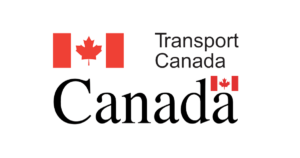
Transport Canada Has Begun Rolling Out Its ‘TDG Online’ Platform
Transport Canada has begun rolling out its ‘TDG Online’ platform, which will act as a web portal for everything to do with the transport of dangerous goods… Read More

U.S. Army Corps of Engineers Recognizes IHMM CSHM
The U.S. Army Corps of Engineers (USACE) Safety and Health Requirements Manual (EM 385-1-1) is the gold standard for Safety and Occupational Health regulations. The manual holds a long history dating back to 1941 and is designed to facilitate the standardization of all safety programs. The EM 385-1-1 prescribes the safety and health requirements for all Corps of Engineers activities and operations. The USACE is soliciting comments on the proposed revisions to EM 385-1-1. USACE intends to update the manual and periodically thereafter, to reflect such public input, experience, and innovation. The agency will address significant comments received in the next revision of this manual.
USACE EM 385-1-1 is undergoing revisions and recognizes the IHMM Certified Safety and Health Manager [CSHM] credential.
IHMM is submitting comments to the proposed revisions to the EM 385-1-1 to also include the CSMP and CHMM credentials. Comments are due by June 13, 2022 and you will find IHMM’s comments here.
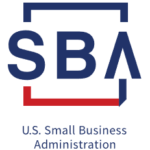
U.S. Small Business Administration Recognizes the IHMM CHMM
SBA’s environmental policies and procedures apply to all SBA Lenders on all 7(a) and 504 loan programs, except where otherwise indicated. For 7(a) loans, failure to comply with the provisions of this paragraph may result in a denial of SBA’s guaranty. Prudent lending practices may dictate additional Environmental Investigations or safeguards. These policies are embodied in SBA SOP 50 10 6, Lender and Development Company Loan Program.
Appendix 4 of the SBA SOP requires that an “Environmental Professional,” as defined by 40 CFR §312.10, perform the Phase 1 or Phase II environmental assessments that may be required prior to closing an SBA-backed loan.
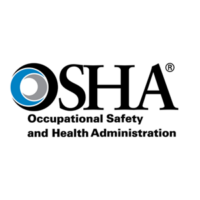
OSHA Seeks Feedback on Effectiveness of Leading Indicators to Improve, Develop Resource Tool
The U.S. Department of Labor’s Occupational Safety and Health Administration is asking for stakeholder input on their current use of leading indicators and their impact on managing their safety and health management systems. Leading indicators are proactive and preventive measures that can provide insight on the effectiveness of safety and health activities and reveal potential problems. They are vital in reducing worker fatalities, injuries, illnesses, and financial impacts.
As OSHA considers developing a Leading Indicators Resource, the agency welcomes stakeholders to share their experience and expertise and provide detailed feedback on how/where they are used at their workplace. OSHA is interested in various perspectives on stakeholders’ answers to questions, such as the following:
- What leading indicators do you use?
- What lagging indicators do you use (OSHA incident rates, for example)?
- What leading indicators are, or could be, commonly used in your industry?
- What metrics do you share with top management?
- How do you determine the effectiveness of your leading indicators?
- Do you link your leading indicators to outcome data, such as OSHA incident rates to evaluate results?
- How could employers be encouraged to use leading indicators in addition to lagging indicators to improve safety management systems?
- What barriers and challenges, if any, have you encountered to using leading indicators?
Individuals may submit comments at regulations.gov by July 17, 2023, which is the Federal eRulemaking Portal, identified by docket number OSHA-2023-0006. For more information, see the OSHA Trade Release.

PHMSA Requests Feedback on Recycled Plastics Policy
On April 14, 2023, the Department of Transportation’s (DOT) Pipeline and Hazardous Materials Safety Administration (PHMSA) published a request for feedback on its recycled plastics policy. 88 Fed. Reg. 23140. PHMSA states that it published the notice to solicit information pertaining to how the potential use of recycled plastic resins in the manufacturing of specification packagings may affect hazardous materials transportation safety; ensure transparency of its current policy pertaining to the use of recycled plastics in the manufacturing of specification packagings; seek input on this policy to inform better potential regulatory changes; and gather information for the evaluation of future approval requests and to inform better decisions pertaining to potential regulatory revisions and other related work. Comments are due July 13, 2023. PHMSA notes that in conjunction with the notice, it is considering conducting a webinar to inform the public of its recycled plastics policy if there is sufficient feedback. PHMSA will post information regarding any future webinars on its website. For more information, please read the full memorandum.
Read more >> https://www.lawbc.com/regulatory-developments/entry/phmsa-requests-feedback-on-recycled-plastics-policy

- IHMM submitted comments on OSHA Advisory Committee on Construction Safety and Health (ACCSH): Notice of Meetings concerning OSHA-2024-0002-0007, and highlighted the creation of IHMM’s Certified Pandemic Preparedness Specialist [CPPS] credential.

- The Occupational Safety and Health Administration has a number of courses in occupational safety and health within which OSHA credits “A degree in occupational safety and health, a Certified Safety Professional (CSP) or a Certified Industrial Hygienist (CIH) designation.” IHMM proposed including the CHMM, CSHM, and CSMP.
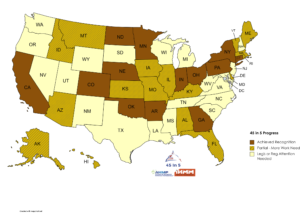
IHMM State Issues – Pending and Completed Actions
In this section you will find the state issues on which IHMM has interests and are pending or completed actions.
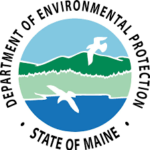
Maine Seeks Comments on Concept Draft Language for PFAS in Products Rule |
The Maine Department of Environmental Protection (MDEP) announced on August 5, 2024, that its Per- and Polyfluoroalkyl Substances (PFAS) in Products Program has developed new concept draft language to implement the recently amended Title 38, Section 1614, the section addressing PFAS in products. MDEP has made the concept draft language available for an informal outreach process until August 30, 2024. Read More

- State of Maine Department of Environmental Protection is proposing to update Chapter 851, Standards for Generators of Hazardous Waste. In the current regulation work is required by a professional engineer. IHMM is proposing to include an environmental professional as defined by 40 CFR §312.10.
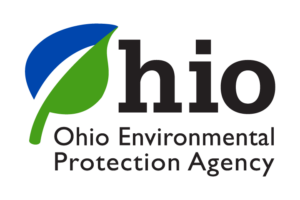
Ohio EPA – Hazardous Waste Program Proposed Rules
May 3, 2023 – 10.30 am – 11.00 am
Organic Air Emissions and Definition of Solid Waste Rules: On March 27, 2023, the director of Ohio Environmental Protection Agency, under the authority of Section 119.03 of the Ohio Revised Code and in accordance with Chapter 119, proposed to original file 173 rules as a part of the Organic Air Emissions and Definition of Solid Waste (OrgAirDSW) rules package. A public hearing on this proposed rulemaking will be held in-person on Wednesday, May 3, 2023, at 50 W. Town Street, Suite 700, Conference Room A (Autumn), at 10:30am.
The hearing will also be held virtually at the same date and time. Advance registration for this hearing may be completed here:
https://attendee.gotowebinar.com/register/5706686780059016797
Any persons intending to give public testimony at said hearing should notify the Ohio EPA Public Interest Center [P.O. Box 1049, Columbus, Ohio 43216-1049, (614) 644-2160]. Written testimony may be either be submitted ahead of the hearing to the below address, electronically to Kit Arthur or Madison Graham, or to the Hearing Officer at the public hearing.
Read more >> https://epa.ohio.gov/about/media-center/events/public-hearing-HazWasteRules
IHMM thanks our friends at Central Ohio CHMM (COCHMM) for sending this to us.
IHMM Credential Recognition
The highest priority of IHMM’s Government Affairs Committee is the recognition of IHMM’s credentials by government. We have made substantial progress in the two years we have undertaken this endeavor, as outlined in detail here > https://ihmm.org/credential-recognition/
In this project we have 45-in-5, increasing the number of states that recognize IHMM credentials.
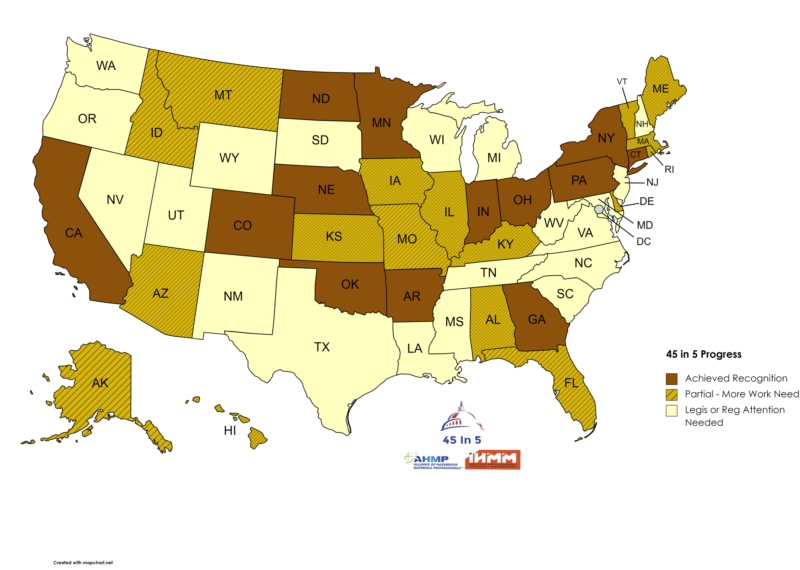
- We have already succeeded in 13 states – New York, Connecticut, Pennsylvania, Indiana, California, Colorado, Nebraska, Minnesota, Arkansas, Oklahoma. Ohio, North Dakota, and Georgia. [Red states in the map above]. These are states where IHMM credentials are cited or 40 CFR 312.10 is cited by reference.
- We have partially succeeded in another 16 states – Alaska, Hawaii, Idaho, Montana, Arizona, Kansas, Iowa, Missouri, Illinois, Kentucky, Florida, Delaware, Rhode Island, Massachusetts, Vermont, and Maine. [Orange/Black Stripe states in the map above] These are states where the requirements of an “environmental professional” or QEP are cited that coincide with an IHMM credential so that relatively little work would need to be done to clarify the desired outcome.
- We have 21 states where no reference to an IHMM credential is made in either statute or regulation, nor is there anything defined in the area of an environmental professional. These states will require legislation or regulatory work. [Yellow states in the map above].
in January 2022 Gene Guilford released the 40 CFR § 312.10 EPA regulation that states a private certification that meets or exceeds the requirements of the regulation is an Environmental Professional under the regulation. Here is the crosswalk between the 40 CFR § 312.10 EPA regulation and the Certified Hazardous Materials Manager [CHMM] blueprint. The CHMM meets or exceeds the requirements of an Environmental Professional.
Here’s what we ask each volunteer to do:
- Watch legislative and regulatory developments in your state that provide an opportunity for us to create amendments or other interventions
- Be willing to speak with regulators and legislators in your area about the recognition efforts we craft together
Accomplishments for 2025
In this section, we will highlight the overall activities undertaken by the committee.
Coalitions – Worked on and signed 6 coalition letters with the Intersociety Forum, AIHA, ASSP, NSC, and SWANA
- IHMM, ISF Advocacy for U.S. Chemical Board Funding
- IHMM NSC Coalition Letter to Congressional Appropriators
- 460 Friends of NIOSH Coalition Letter Here
- Read the final SWANA End of Life Op-Ed here
- OSHA 25-Member Coalition Letter Here
- Here is the Intersociety Forum “Driving Business Growth and Profitability Through Modern Occupational Environmental, Health and Safety Practices” document.
Comments Filed
- Filed comments on Hazardous Materials: Remove Redundant List of U.S. EPA CERCLA Hazardous Substances
- Filed comments on National Freight Strategic Plan 2025 Update: Request for Information
- Filed comments on PHMSA’s ANPRM: Mandatory Regulatory Reviews – IHMM Comments Filed 8-1-2025
- Filed comments on IHMM Files Comments – US DOT Regulatory Information Request
- Filed comments on IHMM Submits Comments on the OSHA Proposed Heat Rule
Collecting Comments
- Collecting comments on USDOL – OSHA – Amending the Medical Evaluation Requirements in the Respiratory Protection Standard for Certain Types of Respirators
- Collecting comments on USDOL – OSHA – Interpretation of the General Duty Clause: Limitation for Inherently Risky Professional Activities
- Collecting comments on USDOL – OSHA – Rescission of Coordinated Enforcement Regulations
- Collecting comments on USDOL – OSHA – Construction Illumination Standards
Reports and Communications
- Reviewed and presented Hazardous Materials Deregulatory NPRMs
- Presented decision memo on EPA Proposes to Rescind the Endangerment Finding
- As a member of the steering committee of Tomorrow’s Workforce Coalition, Tomorrow’s Workforce Coalition Legislation Signed Into Law
- Authored What Is a “529” Plan – How Does It Work – Why IHMM Certificants Benefit
- As a member of the steering committee of the Community Impact Coalition, we worked to prevent Congress from raising taxes on non-profits
- Reported on EPA Extends Comment Period On Draft TSCA Risk Evaluation For DCHP
- Working with the Professional Certification Coalition 2024 Accomplishments and 2025 Priorities
- Reported on NPRM: Advancing Safety of Highway, Rail, and Vessel Transportation


